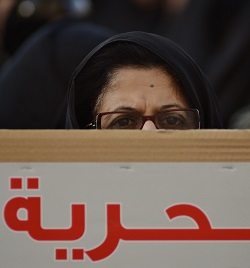This Saturday, May 24, prominent Bahraini human rights defender Nabeel Rajab is scheduled to be released from prison after completing an arbitrary and politically-motivated sentence. After 2 years detention, Rajab will leave prison only to find his country in crisis. Compounding abuses from the past three years have laid waste to human rights in Bahrain, creating a rapidly deteriorating security situation for a key U.S. ally. As the 26th Session of the United Nations (U.N.) Human Rights Council begins next month in Geneva, the United States has the opportunity to lead a coalition of concerned States to frankly and forcefully engage its Gulf ally and encourage it to reverse this dangerous trajectory.
In February 2011, thousands of Bahrainis marched to demand greater political freedom and inclusive democracy. The government responded with violence and embarked on a widely-documented campaign to crush all forms of dissent, resulting in the death of dozens and injuring hundreds. Unfortunately, as reported by the U.S. State Department and international NGOs, the situation in Bahrain has deteriorated considerably since 2011. Human rights defenders are frequently imprisoned and denied adequate medical care; Bahraini prisons currently house over 3,500 political prisoners, including Mr. Rajab. Extrajudicial killings continue, while allegations emerge almost daily that the government has disappeared, tortured, and extracted forced confessions from new victims. With intensifying tensions comes diminished space for moderate voices and dialogue.
Bahrain’s continuing slide toward instability is a major threat to U.S. foreign policy and national security interests in the region. As home to the U.S. Fifth Fleet and Naval Central Command, Bahrain has been a strategic ally of the United States for decades. In addition to its strong military relationship, the United States entered into a free trade agreement with Bahrain in 2006, further cementing a long-term relationship between the two countries.
The Obama administration has relied heavily on quiet bilateral negotiations with Bahrain in an attempt to avoid publically criticizing its ally. This approach has only led to hollow platitudes and empty promises of reform, and placed the United States in a precarious position, trapped between Bahrainis legitimately demanding change and a government more inclined to violate human rights than observe them. With such a disappointing track record, it is clear that business as usual has been ineffective in securing reforms necessary to resolve the political and social crisis in Bahrain.
The United States has the opportunity to enhance stability in Bahrain by working with its allies at the United Nations to secure concrete reform in the country. As evidenced by the expanding list of State signatories to joint statements condemning the human rights situation in Bahrain, a coalition willing to engage the Bahraini government not only exists but is also steadily growing. Spurred by increasing frustration from the U.N. Office of the High Commissioner for Human Rights, this coalition is ready to take action. By taking a lead role in this group during the next Human Rights Council session, the Obama administration can pressure the Bahraini government to uphold its human rights obligations and shift the momentum in Bahrain back toward stability. Indeed, U.S. leadership is critical: the United States is the key actor to which other countries look when considering action on Bahrain.
The U.S. government can address its ally’s downward plunge. It can lead the coalition of states already engaged on Bahrain and help pass a resolution at the Human Rights Council condemning the government’s human rights abuses. Such a resolution must recognize the depth and complexity of challenges facing Bahrain. It must not only include firm and explicit short-term goals but also provide the Bahraini government with a comprehensive framework for resolving the crisis. Explicit amongst these demands must be the release of thousands of Bahraini political prisoners, such as Abdulhadi al-Khawaja, as a first step toward demonstrating greater commitment toward reform.
As U.S. Deputy Secretary of State William J. Burns noted in a recent speech:
…no transition can succeed without a sense of respect for political pluralism and a sense of confidence in a better and more inclusive economic future.
The Obama administration must follow this sentiment with concrete actions at the Human Rights Council meeting in June to make it clear to the government of Bahrain that ongoing human rights abuses andan accompanying slide toward instability are unacceptable. Such a step would not only place significant pressure on the Bahraini government to change, but would also ensure that the United States acts in line with its principles, and on the right side of both democracy and history.
–
Husain Abdulla is Executive Director at ADHRB
This article was originally featured in Muftah.org.





